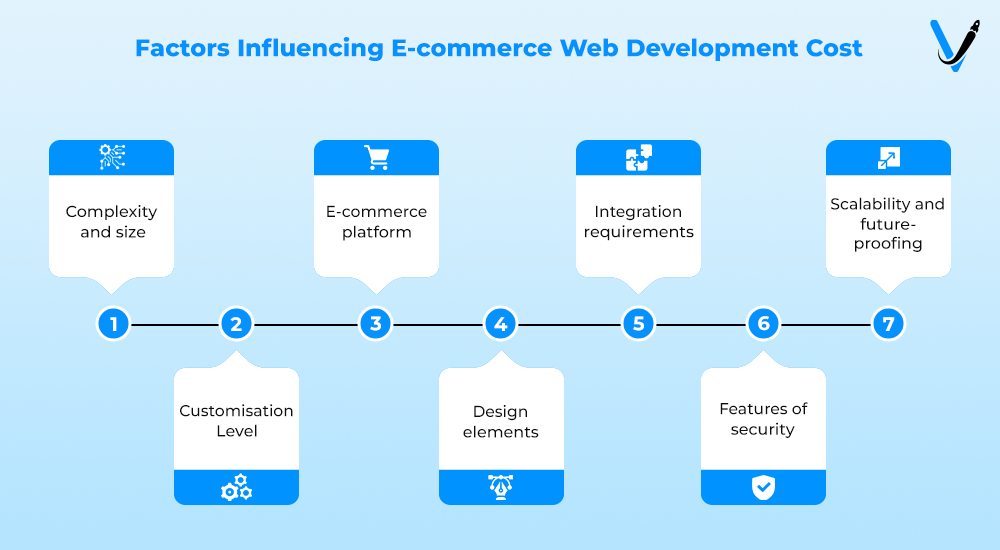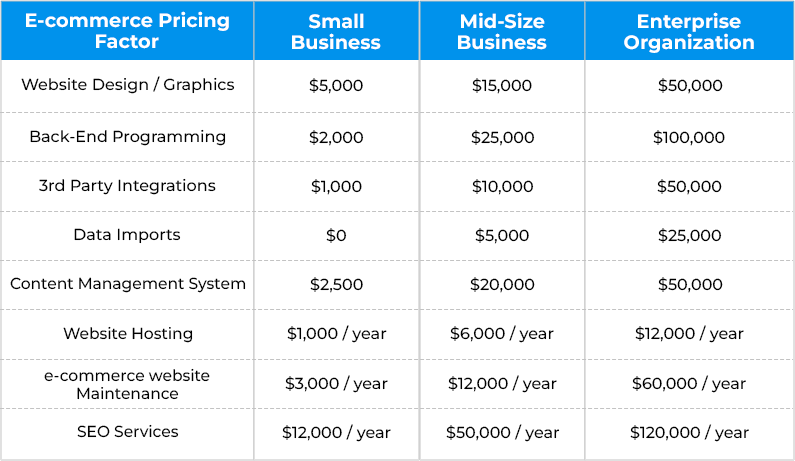In today’s digital age, having a robust online presence is essential for businesses to thrive. With the exponential growth of e-commerce, owning a well-designed and functional website has become a prerequisite for success. However, one burning question often arises is, "How much does it cost to build an e-commerce website in 2024?"
As we delve into the complexities of web development and the ever-evolving landscape of technology, it’s crucial to understand that there’s no one-size-fits-all answer to this question. The cost of an e-commerce website can vary significantly based on a myriad of factors, including the project's scope, desired features, complexity, and the development team's expertise. As an experienced e-commerce development company, we have broken down the cost of e-commerce website development in terms of different factors.
Keep reading this blog to learn what is an e-commerce website, why your business needs an e-commerce website, and the key components that contribute to the overall cost of developing an e-commerce website in 2024:
What is an e-commerce website?
A platform that enables users to purchase goods and services online as opposed to in a traditional storefront is known as an e-commerce website.
Alternatively, it might be characterized as a medium through which organizations can locate digital transactions involving their products or services and obtain compensation.
Examples of e-commerce websites are Amazon, eBay, Craigslist, and Gumtree.
Types of E-commerce Websites
E-commerce websites come in various types, each catering to different business models, products, and services. Here are some common types:
E-commerce platforms can be classified based on:
Business-to-Business E-commerce platform: This business model facilitates the sale of products or services by proprietors of other companies. In 2021 alone, B2B e-commerce sales increased by 17.8%, according to available data. B2B e-commerce platforms include, among others, Oracle SuiteCommerce and AliExpress.
Business-to-Consumer E-commerce platform: A B2C or retail e-commerce platform facilitates transactions between merchants and end users. According to Statista, B2C e-commerce will expand at an 8% CAGR from 2020 to 2024. Retail e-commerce websites include, but are not limited to, Amazon, Netflix, and Airbnb.
Consumer-to-Business E-commerce platform: The principal objective of this platform is to furnish a channel through which enterprises can procure or lease products and services from consumers. C2B e-commerce affiliate marketing contributes between 15 and 30 percent of the revenue of the majority of brands. Upwork is an instance of a C2B e-commerce platform.
Consumer-to-Consumer E-commerce platform: By utilizing a C2C e-commerce platform, consumers are able to sell to other consumers. The market for C2C software e-commerce is anticipated to increase from $1.6 billion in 2022 to $2.8 billion in 2023, according to statistical data. Etsy serves as an illustration of a C2C e-commerce platform.
Why Should You Own an e-commerce website?
There are several reasons to own an e-commerce website. However, we will let numbers speak for themselves. We'll look at the statistics of in e-commerce business. Let's dig in.
Factors Influencing E-commerce Web Development Cost
The entire cost of an e-commerce website can be affected by a number of different factors, including the following:

Complexity and size
The expense increases proportionally to the complexity and size of the website. Developing additional merchandise, pages, and custom features requires additional effort.
Customisation Level
The cost of custom-designed websites generally surpasses that of pre-designed templates. The extent of customization will have a substantial influence on the ultimate expense.
E-commerce platform
Your selection of platform can have a significant impact on the price. Depending on your preference, the majority of platforms will charge you a flat-rate fee for using their service, which is billed monthly or annually. It is frequently possible to preserve savings by deferring payments for an extended duration.
Thereafter, you must consider supplementary expenses, including transaction fees. Additionally, take into account any necessary add-ons, including third-party extensions. Magento, WooCommerce, and Shopify are the three top e-commerce platforms that we have evaluated so that you can assess them and select the one that best meets your needs.
Design elements
The cost may increase if you want professional, high-quality design elements like logos, pictures, and videos. Most people would concur, though, that it's a fee well worth paying given the necessity of upholding a consistent and polished company image.
A skilled design company can guarantee that your visual elements are very striking. After a session in which they get to know your brand and the narrative you wish to convey, they will go over the design aspects they can offer to make this narrative come to life.
Their services include not just design but also A/B testing, optimization, and making sure all design components function properly on all types of devices.
Integration requirements
The requirement for integration with external systems, such as email marketing tools, CRM, or inventory management, raises costs.
Features of security
Strong protection for consumer information and transactions is essential, but implementing advanced security measures can be expensive.
Scalability and future-proofing
It can be more expensive initially, but it is crucial to have a website that grows with your business.
By being aware of these variables, companies can more effectively plan and budget for the creation of an e-commerce website, guaranteeing a platform that will serve their needs both now and in the future.
How Much Does It Cost To Build An e-commerce website?
The cost of developing an e-commerce website can range from $10,000 to over $250,000, depending on factors like complexity, chosen platform (e.g., Shopify, WordPress, Magento), required functionalities, and provider type (e.g., domiciled, offshore, in-house, or outsourced).
Various variables affect pricing, making it difficult to pinpoint an exact figure. Platform choice plays a significant role; SaaS platforms offer hosting and features for a monthly fee, while open-source platforms require more customization but offer flexibility. Custom-built sites offer maximum personalization but are pricier. Site complexity, including product range and features like advanced search or multilingual support, also impacts cost.
Opting for custom design increases expenses but can enhance user experience and conversions. Integrations like social media, CRM, email marketing, and SEO tools add to the total cost but improve website effectiveness.
Breaking Down the Costs: Key Components of an E-commerce Website
Sure, building an e-commerce website involves several key components, each contributing to the overall cost. Here's a breakdown of some of the main components:
Domain Registration and Hosting: Before your e-commerce website goes live, you must register a domain name, which usually costs between $10 and $50 per year. Web hosting, which provides the server space where your website data is stored, can cost anything from $3 per month for simple shared hosting to hundreds of dollars per month for dedicated or cloud hosting solutions.
Because e-commerce websites handle a high volume of traffic and transactions, more robust hosting plans are frequently required.
Website Design and User Experience: Your site's aesthetics and usability are crucial. Pre-made templates can range from free to more than $200, while unique designs can cost anywhere from $5,000 to $30,000, depending on complexity.
Website Development and CMS: This includes the actual construction of your site and might vary greatly depending on whether you're utilizing a self-service platform, an open-source CMS such as WordPress with WooCommerce, or a custom solution. A basic DIY site may cost a few hundred dollars, while a custom-built site could cost $30,000 or more.
SEO and Digital Marketing: While a fully integrated digital marketing plan will increase the cost of the build, it may be necessary for SEO and driving visitors to your site. Following the launch of your website, you may want to hire a Google Ads expert or an SEO consultant to continuously optimize your search engine marketing strategies.
Third Party Integrations: Integrating an e-commerce website with an ERP or other third-party systems can cost thousands of dollars. To process payments, you must integrate a payment gateway. Some systems include this in their monthly rates, while others require an additional integration. Costs can vary from free to 2-3% every transaction, plus a tiny fixed fee.
Security Features: E-commerce sites must spend in SSL certificates (which cost between $50 and $200 per year) as well as additional security features or services such as PCI compliance assessments.
Maintenance & Support: Once your site is up, you'll need continuing assistance with updates, problem resolution, and maintenance. This can cost between $50 and $300 per hour, depending on the service provider's experience, your website platform, and your specific requirements.
E-commerce website Cost Estimates

Interested in Creating an e-commerce website?
Now that the query "how much does it cost to build an e-commerce website?" has been addressed, Let Vasundhara Infotech assist you in getting going. We support large enterprises and startups in building e-commerce systems that are scalable, robust, and have rapid growth.
Consider we to be merely bluffing? View our portfolio of completed projects and client testimonials.
If you would prefer to maintain internal product development procedures, you can hire developers dedicated for your project.
Conclusion
In 2024, there will be a wide range in the cost of creating an e-commerce website due to various aspects such platform selection, feature requirements, design complexity, and continuing maintenance requirements. Although there isn't a universal solution for cost, it is imperative that firms thoroughly evaluate their specific needs and financial limitations prior to initiating the development process.
Are you ready to advance your e-commerce business? For a free consultation and to learn how our expert team can help you realize your vision while staying within your budget, get in touch with us right now.
We can help you succeed in the digital market and enhance your online presence, regardless of how big or little your business is. Together, let's create something truly amazing. Request for a quote now.






